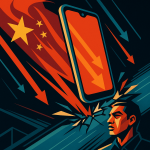Key Points
- The AI revolution is causing a significant shakeup in the PCB industry, with companies supplying **Nvidia** experiencing massive growth while those tied to **Apple** face challenges.
- **Winsun Technology** (Shenghong Keji 胜宏科技) has become the “King of PCB Stocks,” with its stock surging **over 450%** this year, largely due to its 2019 investment in high-end HDI boards and becoming a **Tier 1 supplier for Nvidia’s AI accelerator cards**.
- **PDD Holdings** (Pengding控股 鹏鼎控股), a former PCB leader, is struggling due to its heavy reliance on a single customer (Apple), which accounted for **81.94% of its 2024 revenue**, leading to a **1.83% decrease in net profit** in Q1 2025.
- **AI-grade PCBs** require significantly more layers (**24+ layers** vs. 6-12 for smartphones), higher density (buried/blind vias), and tougher specs to handle the demands of AI servers, creating a major barrier to entry for many manufacturers.
- While Winsun enjoys a first-mover advantage, competitors like PDD Holdings are now **aggressively investing ¥8 billion RMB** to build AI-focused PCB capacity, suggesting the competitive landscape could shift as supply catches up.

The AI revolution is creating a massive shift in the global **PCB** industry, and the scoreboard is getting a serious rewrite.
One company, riding the explosive growth of Nvidia, has seen its fortunes skyrocket.
Another, a long-time giant tied to Apple, is finding that a blue-chip client isn’t the golden ticket it used to be.
This is the story of how Winsun Technology (Shenghong Keji 胜宏科技) overtook PDD Holdings (Pengding控股 鹏鼎控股) and why being in the “Nvidia chain” means feasting, while the “Apple chain” is left sipping broth.
The New King of PCBs Emerges
Let’s start with the hard numbers, because they’re staggering.
In July this year, Nvidia (Yingweida 英伟达) blew past a $4 trillion USD market cap.
By August, it hit $4.5 trillion USD (approx. ¥32.5 trillion RMB). The market sentiment was clear: “Nvidia has no end.”
This tidal wave of growth lifted many boats, but none more dramatically than a Printed Circuit Board (PCB) company from Huizhou, Guangdong called Winsun Technology (300476.SZ).
This year alone, Winsun’s stock price has surged over 450%.
On August 18th, its market cap smashed through the ¥200 billion RMB (approx. $27.4 billion USD) barrier, earning it the title “King of PCB Stocks.”
Image Source: Company Website
A Contrarian Bet That Paid Off
This wasn’t an overnight success.
Go back 30 years, and the founder, Chen Tao (Chen Tao 陈涛), was working his way up at a Taiwanese PCB company. He struck out on his own in 2003 and officially launched Winsun Technology in 2008.
For years, Winsun was a smaller player looking up at giants like PDD Holdings. A decade ago, Winsun’s revenue was just ¥1.285 billion RMB ($176 million USD). PDD Holdings, by contrast, was pulling in ¥17.093 billion RMB ($2.34 billion USD).
The game-changing moment came in 2019.
The industry wasn’t hot on high-end HDI (High-Density Interconnect) boards. But Chen Tao, against internal opposition, made a bold, contrarian decision to go all-in on an HDI business unit.
This single move was the key.
It positioned Winsun perfectly to:
- Enter Nvidia’s H-series AI accelerator card supply system in 2023.
- Pass certification for the highly sought-after GB200 products in 2024.
- Elevate its status to a Tier 1 supplier for the hottest company on the planet.
The results speak for themselves. By Q1 2025, Winsun’s net profit surged 339.22% year-on-year to ¥921 million RMB (approx. $126 million USD). Products for AI and data centers now make up over 40% of their total revenue.

Find Top Talent on China's Leading Networks
- Post Across China's Job Sites from $299 / role
- Qualified Applicant Bundles
- One Central Candidate Hub
Your First Job Post Use Checkout Code 'Fresh20'

The Apple Dilemma: What’s Happening to PDD Holdings?
While Winsun was rocketing up, the former PCB king, PDD Holdings, was facing a very different reality.
To be clear, PDD is still a behemoth. Their 2024 revenue was ¥35.14 billion RMB (approx. $4.81 billion USD) — more than three times that of Winsun.
But there’s a catch, and it’s a big one.
PDD Holdings is trapped in the “Apple chain.”
For years, their single largest customer, widely understood to be Apple, has accounted for a massive chunk of their business.
- 2019: 65.76% of revenue
- 2021: 76.21% of revenue
- 2023: 79.95% of revenue
- 2024: A staggering 81.94% of revenue (¥28.793 billion RMB / $3.95 billion USD)
This heavy reliance on consumer electronics, a market experiencing weak demand, has put a cap on their growth.
In Q1 2025, while their revenue grew, their net profit actually decreased by 1.83% to ¥488 million RMB (approx. $66.8 million USD).
That’s just 52.8% of what Winsun Technology pulled in during the same period.
For years, PDD’s R&D focus was on making things “thin, light, small, high-low, fast, precise, beautiful, detailed, smart.” These are the hallmarks of consumer electronics.
As one insider put it, “PCB products for consumer electronics are constrained by space within mobile phones, so they are thinner and more focused on fine lines; while server boards are generally much thicker.”
PDD is now racing to catch up, investing ¥8 billion RMB (approx. $1.1 billion USD) to build out capacity for AI-related PCBs. They’re developing HDI and SLP (Substrate-Like PCB) products and their new factory in Thailand is targeting AI server and automotive clients.
Image Source: Daily Economic News reporter Wang Jing (Wang Jing 王晶)

ExpatInvest China
Grow Your RMB in China:
- Invest Your RMB Locally
- Buy & Sell Online in CN¥
- No Lock-In Periods
- English Service & Data
- Start with Only ¥1,000

The Tech Behind the Throne: Why AI PCBs Are a Different Beast
So, what’s the big deal? A PCB is a PCB, right?
Not quite.
PCBs are the “mother of electronic products,” the foundational board that connects all the components. But the demands of an AI server are worlds apart from an iPhone.
The AI hardware boom, driven by massive GPU clusters and high-speed optics, requires PCBs to be built on a whole different level.
Here’s the technical breakdown:
- More Layers: A typical smartphone PCB might have 6-12 layers. An AI server board? We’re talking 24 layers or more. These boards are thick.
- Higher Density: AI-grade HDI boards use buried and blind vias (tiny vertical connections) instead of traditional through-holes. This frees up immense space for routing signals, which is critical for performance.
- Tougher Specs: These boards have to handle insane speeds with minimal signal loss. The requirements for materials and impedance control are extremely strict.
This makes manufacturing AI-grade PCBs incredibly difficult. You can’t just flip a switch.
As one industry analyst noted, “AI-grade HDI requires very high standards… and the boards are thicker. Therefore, many manufacturers currently lack the production capacity for these. Whoever expanded capacity earlier has a temporary lead, like Winsun Technology.”
What’s Next? Can Winsun Hold the Crown?
This brings us to the big question: “Do I still have a chance?”
Winsun believes it has a significant first-mover advantage. They claim that in the AI era, each product generation requires 2 to 3 years of collaborative R&D with the client (like Nvidia). This creates a deep, technological moat that’s hard for competitors to cross.
But the competition isn’t standing still.
Analysts point out that PDD Holdings and others are aggressively expanding their own AI-focused production capacity.
An insider familiar with PDD stated, “PDD has no technical issues; its current challenge is simply keeping up with capacity.” The company is actively courting AI clients, though they remain tight-lipped on whether Nvidia is one of them.
Once competitors ramp up production, the competitive landscape could shift again. Winsun’s sky-high gross profit margins might come back down to earth as supply catches up with demand.
The AI boom is a stark reminder that in the world of tech, no throne is safe.
It’s not just about chips and code; the revolution is reshaping the entire hardware supply chain, right down to the foundational level.
The incredible rise of Winsun Technology is a masterclass in strategic foresight, showing how one bold, contrarian bet can redefine an entire industry. For investors, founders, and techies, it’s a powerful case study on how quickly the tides can turn, proving that the leader in the **PCB** space today could easily be the challenger tomorrow.

Resume Captain
Your AI Career Toolkit:
- AI Resume Optimization
- Custom Cover Letters
- LinkedIn Profile Boost
- Interview Question Prep
- Salary Negotiation Agent





